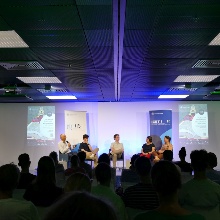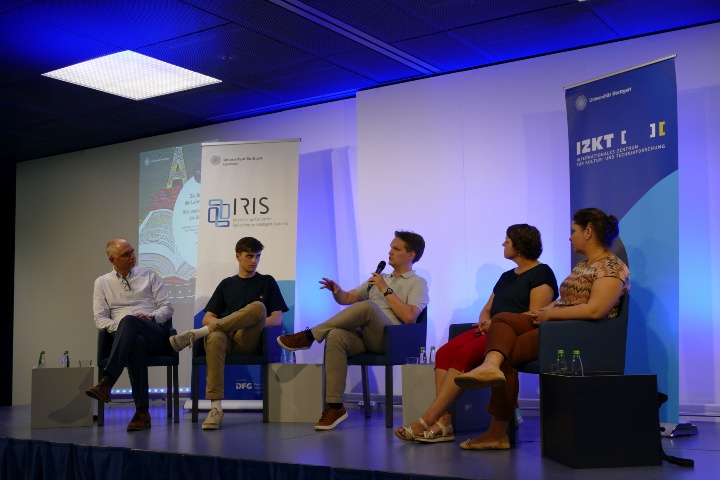How do AI and school fit together? Experts discussed this on July 11, 2023, at the second event of the series “Living, Learning, and Writing with AI: ChatGPT and the consequences”. More than 50 people attended on site. Even more joined in on line via live stream.
In the fall of 2022, the general public was first introduced to the potential of AI in the form of ChatGPT, a tool that acts as a learning coach or ghostwriter and even responds to the request to insert plausible errors in order to make the output seem more authentic. What are the implications for schools? What approaches can help students and teachers appropriately use this innovation? Moderator Felix Heidenreich, scientific coordinator of the International Center for Cultural and Technological Research (IZKT), ventured a look into the near future with experts.
Critical questioning in education and schools
A common thread running through the evening was the insight provided by Prof. Maria Wirzberger of the University of Stuttgart, spokesperson of IRIS (Interchange Forum for Reflecting on Intelligent Systems). “It’s the critical eye that defines us as people,” said Wirzberger. “That’s why we need to start training the next generation of teachers to question things critically.”
“How are the students’ own achievements still verifiable?” asked moderator Heidenreich. “Do we need to focus more on oral examinations without technical aids?” said Irmi Mühlhuber from the Center for School Quality and Teacher Education Baden-Württemberg as she called on all teachers to recognize and use the scope that already exists in the current exam regulations. She added that classroom tasks would have to change first before centralized testing formats could be changed.
Florian Nuxoll, a teacher as well as author and editor of the Medienwelten series and a research associate at the University of Tübingen, suggested that more emphasis might need to be placed on teaching factual knowledge in the classroom because “those who know nothing are compelled to believe everything.” And the error rate with ChatGPT is high. At least for the moment! But what if AI continues to evolve in what some refer to as “double exponential growth”? It will then become more difficult to teach students to critically question the results generated by ChatGPT.
Opportunities and risks for a democratic and social society
The implications for social justice were also discussed. These are conceivable in both directions. On one hand, ChatGPT could provide help for children from educationally disadvantaged households, thereby evening out differences in background. On the other hand, the paid full version ChatGPT 4.0 costs EUR 20 per month, which not every household can afford.
Effects on democracy are also conceivable. For example, more misinformation could be spread by AI and used in a more manipulative way by conspiracy theorists to attack democracy. “We need to ask ourselves how we can protect our democracy,” said Nuxoll. “This is one of the most important issues in the coming years and decades.”
The danger of isolation tendencies was also discussed. While individualized AI-based tutoring systems can support children at their respective levels, this widens the gap between already bright students who improve quickly and those who learn more slowly. The panel agrees that social and group learning is more important than ever in order to be able to counteract such tendencies.
Learning to use AI responsibly
For teachers, ChatGPT could save time resources in lesson preparation. According to Mühlhuber, getting inspiration for teaching via AI is even the best use case.
The panel agreed that Germany could learn a lot from other countries when it comes to the targeted use of AI in both teaching and research. However, the legal situation for such deployment options is still far from being clarified in the EU.
There is also agreement that the skills of students need to change – toward assessment skills such as problem-solving and critical questioning. Students need to learn to understand how AI tools work and what their ethical implications are and then use them responsibly and proficiently.
Mühlhuber emphasized that in order to be able to impart such skills, teacher training must be the starting point. From the students’ point of view, Ruben Schäfauer from the Stuttgart Youth Council reports on the still difficult or lack of handling of the new technology by teachers. “It’s there. And saying don’t use ChatGPT won’t work,” says Schäfauer. “We have to be careful that students don’t run away from teachers when it comes to digital literacy.” “Teaching is a shared construction of knowledge. The hierarchy between teacher and learner in which the former knows everything has long since ceased to exist,” added Nuxoll.
The interesting and entertaining discussion between the experts gives us hope that a good way of dealing with AI in the classroom can be found. To paraphrase Maria Wirzberger: “AI is an opportunity because we are talking about it”.
About the event series
The interdisciplinary series “Living, Learning, and Writing with AI: ChatGPT and the Consequences” includes events from June to November 2023 and is hosted by IZKT as well as IRIS of the University of Stuttgart in cooperation with the Stuttgart Public Library. The series, which as conceived and organized by Félicie Kohlrausch (IZKT), is supported by Dr. Simone Rehm, Vice Rector for Information Technology. The third date in the series will be Wednesday, November 8, 2023. The topic will be “Tamed bots: Who should regulate AI – and how?”.
The University of Stuttgart invites students and employees to attend a discourse about the importance of chatbots in science. All background information, events, and news are summarized on our website ChatGPT at the University of Stuttgart.



